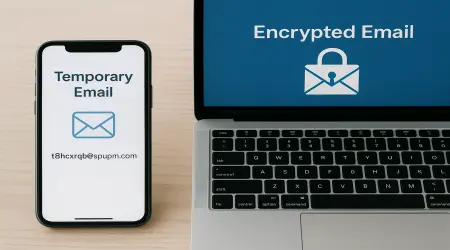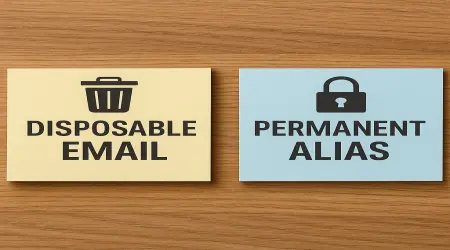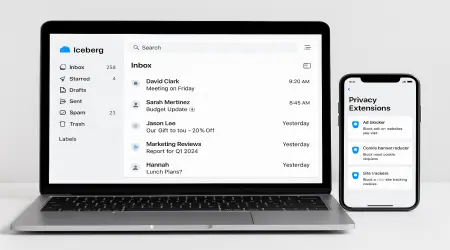

Temporary Email vs. Encrypted Email Providers: Which Protects You Better?
Temporary Email vs. Encrypted Email Providers: Which Protects You Better? 🔐📧
Email is one of the most common ways we communicate online—but it’s also one of the easiest ways our privacy can be compromised. Spam, tracking, phishing, and data leaks all often start with a single email address.
Two tools promise protection: temporary email services and encrypted email providers. Both aim to keep you safe, but they do it in very different ways. The big question: which protects you better?
🚦 What Is Temporary Email?
Temporary (or disposable) email gives you a short-lived address you can use once or for a limited time.
How it works: Sites like 10 Minute Mail, Guerrilla Mail, or Iceberg Mail generate a random inbox you can access instantly—no registration required.
Best for: One-time sign-ups, downloads, or online forms.
Example: You want to download a free recipe eBook but don’t want daily marketing spam. You use a disposable email, get the eBook, and never check that inbox again.
✅ True: Temp emails protect you from spam and unwanted marketing.
⚠️ Limitation: They don’t offer encryption, and many free versions are public (anyone with the link could see your inbox). That’s why they should not be used for sensitive information.
🔒 What Are Encrypted Email Providers?
Encrypted email providers focus on security. They protect the contents of your email, not just your address.
How it works: Services like ProtonMail, Tutanota, or StartMail encrypt messages end-to-end. Only the sender and recipient can read them. Even the provider itself can’t access your content.
Best for: Private conversations, professional work, or sensitive data like legal or medical documents.
Example: A lawyer sends confidential files through ProtonMail. Even if hackers intercept the message, it appears as scrambled code without the right key.
✅ True: Encrypted providers offer real security for your messages.
⚠️ Limitation: They don’t protect against spam when you give out your real address, and they don’t stop companies from storing the fact that you signed up with them.
⚖️ Comparing Protection
Here’s how they stack up side by side:
| Feature | Temporary Email | Encrypted Email Providers |
|---|---|---|
| Main Strength | Hides your real address; keeps spam away. | Protects the content of your emails. |
| Best For | Quick, one-time tasks. | Ongoing secure communication. |
| Example Use | Sign up for a contest without junk mail. | Send financial or legal documents safely. |
| Weakness | No encryption; inbox may be public or short-lived. | Still tied to your identity unless you use aliases. |
| Ease of Use | Instant, no setup. | Requires account setup and sometimes subscription. |
📚 Real-World Scenarios
Signing up for an online store discount 🛍️ → Temporary email is safer. You don’t want their promotions forever.
Sharing sensitive medical records 🏥 → Encrypted email is safer. You need strong message protection, not just a throwaway inbox.
Testing a new app or service 📱 → Temporary email is safer. Quick, disposable, no risk to your main inbox.
Business communication 💼 → Encrypted email is safer. It ensures private, professional conversations remain confidential.
🧊 Where Iceberg Mail Fits
Iceberg Mail bridges both needs:
Instant disposable emails to keep your real inbox spam-free during one-time sign-ups.
Private aliases for long-term accounts, so you stay organized and protected.
While it doesn’t replace encrypted services like ProtonMail for highly sensitive data, it gives everyday users speed, privacy, and simplicity in situations where encryption isn’t required.
It’s like having both a paper mask for quick errands 🎭 and a vault for valuables 🔐—you choose the right tool for the right moment.
✨ Bottom Line
Neither tool is “better” overall—it depends on what you need:
Temporary email = Best for quick, low-risk tasks where you just want to stay invisible.
Encrypted email = Best for secure, long-term communication where content privacy matters.
The truth is, many people benefit from using both: a disposable email for everyday clutter, and an encrypted provider for serious conversations. Together, they cover your privacy from both spam and prying eyes.

